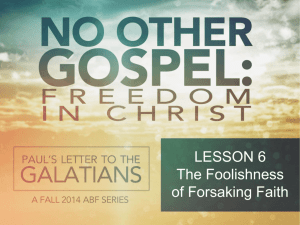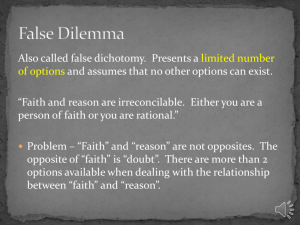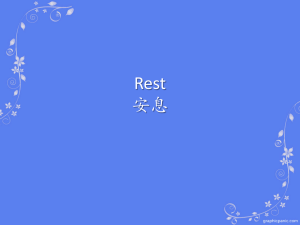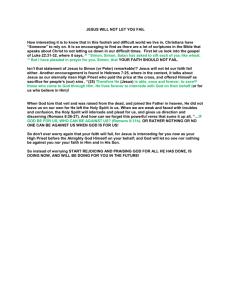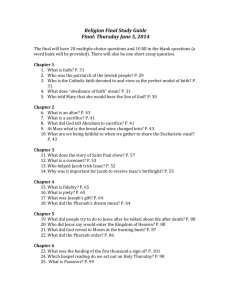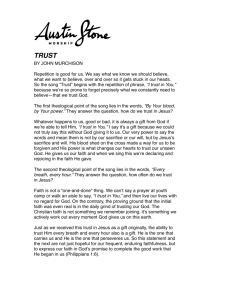II. Some Bible Passages for Reflection
advertisement
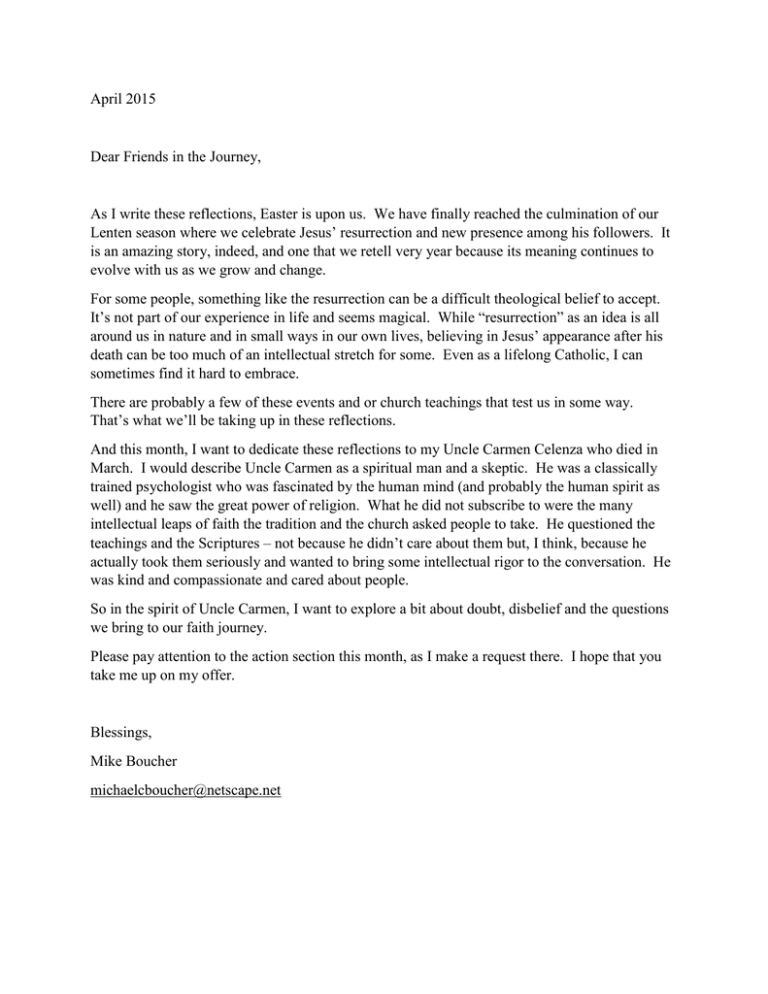
April 2015 Dear Friends in the Journey, As I write these reflections, Easter is upon us. We have finally reached the culmination of our Lenten season where we celebrate Jesus’ resurrection and new presence among his followers. It is an amazing story, indeed, and one that we retell very year because its meaning continues to evolve with us as we grow and change. For some people, something like the resurrection can be a difficult theological belief to accept. It’s not part of our experience in life and seems magical. While “resurrection” as an idea is all around us in nature and in small ways in our own lives, believing in Jesus’ appearance after his death can be too much of an intellectual stretch for some. Even as a lifelong Catholic, I can sometimes find it hard to embrace. There are probably a few of these events and or church teachings that test us in some way. That’s what we’ll be taking up in these reflections. And this month, I want to dedicate these reflections to my Uncle Carmen Celenza who died in March. I would describe Uncle Carmen as a spiritual man and a skeptic. He was a classically trained psychologist who was fascinated by the human mind (and probably the human spirit as well) and he saw the great power of religion. What he did not subscribe to were the many intellectual leaps of faith the tradition and the church asked people to take. He questioned the teachings and the Scriptures – not because he didn’t care about them but, I think, because he actually took them seriously and wanted to bring some intellectual rigor to the conversation. He was kind and compassionate and cared about people. So in the spirit of Uncle Carmen, I want to explore a bit about doubt, disbelief and the questions we bring to our faith journey. Please pay attention to the action section this month, as I make a request there. I hope that you take me up on my offer. Blessings, Mike Boucher michaelcboucher@netscape.net I. Fire-Starter Questions 1. What is one thing that you find hard to believe in the Bible? 2. What is one thing that you find hard to believe in church teaching (or in the faith tradition)? 3. What do you do with your faith questions? How do those get expressed? To whom do you talk about them? II. Some Bible Passages for Reflection John 20:24-25 Thomas, called Didymus, one of the Twelve, was not with them when Jesus came. So the other disciples said to him, “We have seen the Lord.” But he said to them, “Unless I see the mark of the nails in his hands and put my finger into the nailmarks and put my hand into his side, I will not believe.” Mark 16:11,13,14 When they heard that [Jesus] was alive and had been seen by Mary Magdalene, they did not believe…. [Still more disciples who had seen Jesus] returned and told the others; but they did not believe them either…. [But] later, as the eleven were at table, he appeared to them and rebuked them for their unbelief and hardness of heart because they had not believed those who saw him after he had been raised. 1 Thessalonians 5:21 Test everything. Hold on to the good. Genesis 32:24-28 But Jacob stayed behind by himself, and a man wrestled with him until daybreak. When the man saw that he couldn’t get the best of Jacob as they wrestled, he deliberately threw Jacob’s hip out of joint. The man said, “Let me go; it’s daybreak. Jacob said, “I’m not letting you go ’til you bless me.” The man said, “What’s your name?” He answered, “Jacob.” The man said, “But no longer. Your name is no longer Jacob. From now on it’s Israel (God-Wrestler); you’ve wrestled with God and you’ve come through.” III. Some Questions for Reflection 1. How much do you relate to Thomas (or how similar is your experience of faith)? Do you need to “see” to believe? What are advantages to Thomas’ approach? Disadvantages? 2. It seems as though a lot of people in the Bible had a hard time believing that Jesus had risen from the dead – especially people close to Jesus. How do you understand that story? 3. Paul encourages us to test everything. What in your experience of faith requires testing? What are some things that you believe without much testing? 4. Jacob wrestles with a stranger in this story (who turns out to be God). The stranger never chastises Jacob for wrestling. In fact, God seems to be pleased that Jacob didn’t give up and put up a god fight. What were your experiences with respect to questioning faith/religion? Was it encouraged or discouraged? IV. Commentary Rev. Jonathan Weyer who writes for the Huffington Post online says, “As I read through the biblical discussion of doubt, I realized how much the Bible really does describe reality, especially the reality of the human condition. It calls us to question and to doubt. The relief I felt can barely be described. I felt liberated. I could openly bring out my doubts and not get struck by lightning.” 1 For a lot of us, doubting or questioning our faith was something that was discouraged. There was a lot that we were supposed to just believe and accept. And for many of us, we might not have agreed with it, it did not fit with our experience, we knew it to not be true or just had serious questions about what we were hearing – but did not have permission or a way in which to question it. We might have been quoted other Christian scriptures about faith and belief that encouraged us to just accept what was coming our way. Quotes like…. Proverbs 3: 5 - Trust in the Lord with all your heart, and do not lean on your own understanding. Matthew 8:26 - And he said to them, “Why are you afraid, O you of little faith?” James 1: 6 - for the one who doubts is like a wave of the sea that is driven and tossed by the wind. For some of us it might have felt like we only had two choices – believe what we were being told or hit the road. Some hit the road. This is unfortunate because we need a faith that can be questioned. We need a faith that can stand up to scrutiny. We need a faith that makes sense. 1 http://www.huffingtonpost.com/rev-jonathan-weyer/what-the-bible-really-say_b_862356.html? What we probably need to keep acknowledging is that our “faith” life has (at least) two parts to it. One part is our own relationship to God/Jesus. The other part is our relationship to the “church” (the more formal set of beliefs espoused by a wider body). And even pausing here for a moment, it may be helpful to reflect which part might be the easier part or you and which part might generate more problems of questions. Michael Morwood, an adult faith educator who teaches around the world, writes a good deal about theology and faith.2 He says that one of the big problems for Christians (and Catholics in particular) goes back to the first 100 years of Christianity when we began to develop ideas around Jesus’ divinity. Divinity was always associated with something “out there” (e.g. heaven is in the sky somewhere) as opposed to something “inside” of us (even though Jesus likely said that the “kingdom of God is within you” (Luke 17:21) and was clear that it is not what goes into a person that defiles them (Matthew 15:11) but what comes from inside them). Once we made that shift, however, a bunch of theological axioms had to be developed to account for Jesus’ divinity. Morwood says that some of the implications were: a virgin birth, Jesus needing to ‘know everything’ because he was God, original sin, Jesus needing to die for our sins, the concept of salvation, etc. Many of these developments are points that are difficult for people. And then when we get to church teaching, there are many teachings that become stumbling blocks for a lot of people. Again Morwood (and others) argue that we need to be more honest in the church about many things. For example, as far as we can tell, Jesus was born, lived and died a Jew. He did not see himself “starting” new religion nor did he instruct his followers to do so. He did not specifically “ordain” anyone at the last supper, and early historical church records (including Paul’s epistles) clearly state that women were equal leaders from the beginning. Furthermore, we see no evidence in Jesus’ life (and certainly not in the Jewish faith) that we need “mediators” (like priests) to be the go-betweens for us and God. Throughout history, the Church has not been the best at fielding questions and dissenters – questions about God or questions about the church itself. While I understand that there is a need to hold together the faithful through a common set of beliefs and understandings AND that these can’t just keep changing because someone (or a group of people) doesn’t like or believe them, the Church has not shown a great receptivity to even allowing conversations to happen that challenge or raise serious questions. We have seen this with scientific advancements through the years, and it would stand to reason that the same is true for other advancements as well (like spiritual advancements). I think one of the things that made it hard for someone like my Uncle Carmen was that there was almost no room for him in the church – not because he made it so – but because the church made it that way. He couldn’t have his questions and a faith that made sense. 2 Morwood spent 29 years as an Australian Catholic priest until his 1998 book, Tomorrow’s Catholic, brought him under theological scrutiny. He was offered laicization, but refused. Eventually he chose to leave the formal priesthood, married and now teaches and gives retreats. His work is very engaging and I highly recommend it. www.morwood.org The Second Vatican Council was certainly an attempt by the church to open itself and allow questions to be asked that had not been allowed previously. And it went a long way in promoting change and a reinterpretation of the faith that – instead of watering it down – made it more relevant and fresh. The questions didn’t make it lose something, the questions helped it to gain something. So imagine if we had another Vatican Council or even a local convocation where “the faithful” were asked to bring their questions. What do you think would come forward? What conversations would people want to have? What do people struggle with? In 1975, the Jesuit philosopher, John Kavanaugh, went to work for three months with Mother Teresa in India. He had been struggling spiritually and went to her suspecting that she might have some answers. On his first morning there, she asked him, “And what can I do for you?” Kavanaugh asked her to pray for him. “What do you want me to pray for?” she asked. He answered with the very reason he traveled thousands of miles to India: “Pray that I have clarity.” Mother Teresa said firmly, “No. I will not do that.” Surprised, he said, “Why not?” Mother Teresa said, “Clarity is the last thing you are clinging to and must let go of.” When Kavanaugh said, “But you always seem to have clarity,” Mother Teresa laughed and said, “I have never had clarity. What I have always had is trust. So I will pray that you trust God.” I relay this story because in any conversation about the faith and questions/doubts, we’re never going to have absolute clarity about anything. So, like Mother Teresa, we probably shouldn’t spend our time trying to be “right” or wishing for clarity. Maybe the best that we can strive for is (to borrow a phrase from poet David Whyte) courageous conversation – conversation that helps us go deeper into the mysteries of our lives and our hearts. We also might have to admit that, when it comes to the faith life, we’re all a mix of contradictions. Walt Whitman in his Song of Myself says, “Do I contradict myself? Very well then I contradict myself, I am large, I contain multitudes.” The Church as a human institution is filled with contradictions just like we are. The question is, can we accept that and be open to stepping into that space. And, ultimately, we might want to think about what difference our questions make to our faith experience. For some, the questions and doubt might greatly interfere with our faith life and/or our relationship with God. For others, our relationship with God is just fine, it’s our relationship with the church that gets challenged. For others, it could be that we have questions but that they don’t change much of our day-to-day experience. Whatever the case, I encourage you to bring your questions, your doubt and your challenges forward. And if, somehow, you are in a position of authority (in the church or in any other arena), I hope that you can make space for people’s questions and challenges. V. Action Step As a result of these reflections, one action I will take is…. I am asking you to send me your questions/challenges/doubts. I would love to make a list of what’s on people’s minds these days…..


